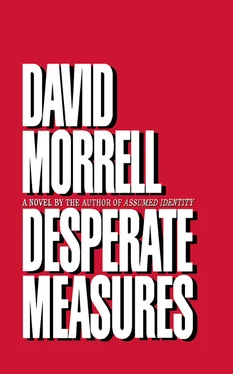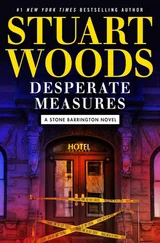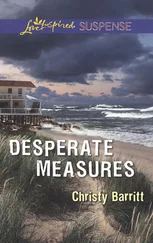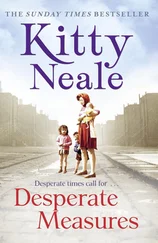David Morrell - Desperate Measures
Здесь есть возможность читать онлайн «David Morrell - Desperate Measures» весь текст электронной книги совершенно бесплатно (целиком полную версию без сокращений). В некоторых случаях можно слушать аудио, скачать через торрент в формате fb2 и присутствует краткое содержание. Жанр: Триллер, на английском языке. Описание произведения, (предисловие) а так же отзывы посетителей доступны на портале библиотеки ЛибКат.
- Название:Desperate Measures
- Автор:
- Жанр:
- Год:неизвестен
- ISBN:нет данных
- Рейтинг книги:3 / 5. Голосов: 1
-
Избранное:Добавить в избранное
- Отзывы:
-
Ваша оценка:
- 60
- 1
- 2
- 3
- 4
- 5
Desperate Measures: краткое содержание, описание и аннотация
Предлагаем к чтению аннотацию, описание, краткое содержание или предисловие (зависит от того, что написал сам автор книги «Desperate Measures»). Если вы не нашли необходимую информацию о книге — напишите в комментариях, мы постараемся отыскать её.
Desperate Measures — читать онлайн бесплатно полную книгу (весь текст) целиком
Ниже представлен текст книги, разбитый по страницам. Система сохранения места последней прочитанной страницы, позволяет с удобством читать онлайн бесплатно книгу «Desperate Measures», без необходимости каждый раз заново искать на чём Вы остановились. Поставьте закладку, и сможете в любой момент перейти на страницу, на которой закончили чтение.
Интервал:
Закладка:
7
They veered from the road, following a paved lane up a treed incline. A white wooden fence had an open gate. They passed a small building that reminded Pittman of a sentry box at the entrance to a military base, but no one was there, and Pittman assumed that the building was for deliveries.
At the top of the incline, the view was spectacular enough to make Jill stop driving. On each side, fir trees stretched along a ridge, rising toward mountains. But directly ahead and below, the trees had been cleared, replaced by an impressive expanse of grassland. In the valley, there were stables, horses in a pasture, an equestrian ring, and a polo field. Adjacent were several football fields. In the distance, an oval-shaped lake glinted with the reflection of sunlight, and Pittman remembered the importance that Professor Folsom had said the school placed on team rowing.
But Pittman’s attention was mostly directed toward the buildings in the center of the valley: a traditional white-steepled church, an imposing pillared building that was probably the school’s administration center, fifteen other structures made of brick, covered with ivy.
“Dormitories and classroom buildings,” Pittman said. “Solid, efficient, functional. What the Establishment considers roughing it.”
Jill looked puzzled. “You really have a problem about privileged society.”
“To rephrase Will Rogers, I never met a rich person I liked.”
“ I’m rich.”
“But you don’t act rich…. I had an older brother,” Pittman said.
Jill looked as if she didn’t understand the jump in topics.
“His name was Bobby. He taught me how to ride a bicycle, how to throw a baseball. When I came home with a black eye from a fight in the school yard, he showed me how to box. There wasn’t anything Bobby couldn’t do. He was my idol. God, how I loved him.”
“You keep using the past tense.”
“He died in Vietnam.”
“Oh…. I’m sorry.”
“He didn’t want to go,” Pittman said. “He didn’t believe the war was right. But my parents didn’t have any money, and Bobby didn’t have the means to go to college and he couldn’t get a draft deferment. I remember him cursing about how all the rich kids got deferments but he couldn’t. All of his letters mentioned the same thing-how everybody in his unit was part of the Dis establishment. Of course, Bobby used cruder terms. He kept writing about a premonition he had, about how he was sure he wouldn’t be coming back. Well, he was right. Friendly fire killed him. I used to go to the cemetery every day to visit him. I remember thinking how easy it was for rich people to start wars when their children wouldn’t have to fight. Later, after I saved enough money from working on construction to go to college, I realized something else-those rich people got richer because of the wars they started. That’s why I became a journalist. To go after those bastards. To get even for my brother.”
“I’m sorry,” Jill repeated.
“So am I.” Pittman stared down at his bandaged hand. “I apologize. I didn’t mean for all that to come out.”
Jill touched his arm.
8
The buildings were situated along a square that reminded Pittman of a parade ground. Pavement flanked each side of the square, and Jill almost parked there, until she saw a lot next to what appeared to be the administration building. Fifteen other cars were already parked there.
Pittman got out of the Duster, conscious of the.45 under his sport coat. It dismally occurred to him that one mark of how far he had come since his suicide attempt Wednesday night was that he thought of being armed as ordinary.
Jill locked the car and came around to join him. Her sneakers, jeans, and sweater were in a small suitcase in the backseat. The brown pumps, sand-colored A-line skirt, forest green jacket, and yellow blouse that she’d bought in Montpelier fit her perfectly. Pittman still wasn’t used to seeing her in clothes that weren’t casual and loose. The lines of her legs were as elegant as those of her throat.
“Ready?”
Jill inhaled nervously and nodded, securing the strap of her purse to her shoulder. “It’s heavy.”
“Just try to forget a weapon’s in there.”
“Easy advice from you. I still don’t see why it couldn’t stay in the car.”
“Because things keep turning out differently from the way I expected.”
They walked from the parking lot and watched as the square, which had been deserted except for a few groundskeepers, suddenly filled with hurrying students a few seconds after a bell rang in several of the buildings.
Wearing uniforms of gray slacks, navy blazers, and white shirts with red striped ties, the boys moved with brisk determination from what seemed to be classroom buildings, crossing toward a larger building opposite the church.
“Fire drill?”
Jill glanced at her watch. “Noon. Lunchtime.”
A boy of about fifteen stopped before them. Like the others, he had brightly polished black shoes and neatly cut short hair. His gaze was direct, his voice confident, his posture straight. “May I help you, sir?”
“We were wondering where the school library is,” Pittman said.
The boy pointed to Pittman’s left. “In building four, sir. Would you like to see Mr. Bennett?”
“Mr. Bennett?”
“The academy’s director.”
“No. There isn’t any need to bother him. Thank you for your help.”
“You’re welcome, sir.” The boy turned and continued quickly toward the building the other students were entering on the opposite side of the square. Although they hurried, they managed to look like gentlemen.
“He’ll be a credit to Washington insiders,” Pittman said.
He and Jill walked in the direction the young man had indicated, reached a brick building with the number 4 above its entrance, and left the noon’s intense sunlight, entering a cool, well-lit stairwell that smelled sweetly of wax. Steps led down and up.
The building was eerily silent.
“I doubt very much that a library would be in the basement,” Jill said. “Too much danger of moisture getting into the books.”
Nodding in agreement, his footsteps echoing, Pittman went up to the first floor. A hallway had several doors on each side. Many of the doors were open. In one, study desks were equipped with computers. In another, the desks had tape players and earphones, probably for language study.
As Pittman approached a third door, an elderly man came out, holding a key, about to close the door. He wore the same uniform that the students had been wearing. Short and somewhat heavy, he looked to be about sixty, with a salt-and-pepper mustache and receding gray hair.
He peered over his glasses toward Pittman and Jill. “I was just going to lunch. May I help you?”
“We were told that the library is in this building.”
“That’s correct.” The man cleared his throat.
“Is that where you keep old yearbooks, things like that?” Pittman asked.
“They would be in our archival section.” The man squinted. “I don’t believe I’ve met you before. Why exactly would you need to know?”
“My name is Peter Logan. I’m a freelance journalist, and I’ve decided to write the book I always promised myself I would.”
“Book?”
“About Grollier Academy. A great many distinguished public servants have graduated from this school.”
“You could say that we’ve had more than our share. But I strongly suspect that they wouldn’t want their privacy invaded.”
“That isn’t what I had in mind. Grollier Academy itself, that would be my emphasis. I thought it would be an example to other schools if I wrote about the superior methods of this one. This country’s in a crisis. If our educational system isn’t changed… I’m worried about our future. We need a model, and I can’t think of a better one than Grollier.”
Читать дальшеИнтервал:
Закладка:
Похожие книги на «Desperate Measures»
Представляем Вашему вниманию похожие книги на «Desperate Measures» списком для выбора. Мы отобрали схожую по названию и смыслу литературу в надежде предоставить читателям больше вариантов отыскать новые, интересные, ещё непрочитанные произведения.
Обсуждение, отзывы о книге «Desperate Measures» и просто собственные мнения читателей. Оставьте ваши комментарии, напишите, что Вы думаете о произведении, его смысле или главных героях. Укажите что конкретно понравилось, а что нет, и почему Вы так считаете.












